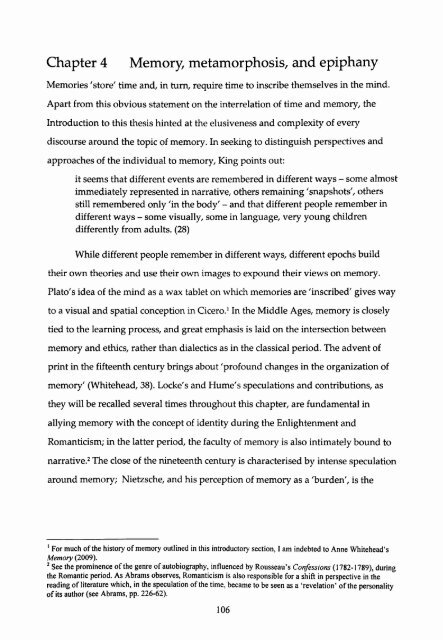HERMANN HESSE AND THE DIALECTICS OF TIME Salvatore C. P. ...
HERMANN HESSE AND THE DIALECTICS OF TIME Salvatore C. P. ...
HERMANN HESSE AND THE DIALECTICS OF TIME Salvatore C. P. ...
Create successful ePaper yourself
Turn your PDF publications into a flip-book with our unique Google optimized e-Paper software.
Chapter 4 Memory, metamorphosis, and epiphany<br />
Memories 'store' time and, in turn, require time to inscribe themselves in the mind.<br />
Apart from this obvious statement on the interrelation of time and memory, the<br />
Introduction to this thesis hinted at the elusiveness and complexity of every<br />
discourse around the topic of memory. In seeking to distinguish perspectives and<br />
approaches of the individual to memory, King points out:<br />
it seems that different events are remembered in different ways - some almost<br />
immediately represented in narrative, others remaining 'snapshots', others<br />
still remembered only 'in the body' - and that different people remember in<br />
different ways - some visually, some in language, very young children<br />
differently from adults. (28)<br />
While different people remember in different ways, different epochs build<br />
their own theories and use their own images to expound their views on memory.<br />
Plato's idea of the mind as a wax tablet on which memories are 'inscribed' gives way<br />
to a visual and spatial conception in Cicero. 1 In the Middle Ages, memory is closely<br />
tied to the learning process, and great emphasis is laid on the intersection between<br />
memory and ethics, rather than dialectics as in the classical period. The advent of<br />
print in the fifteenth century brings about 'profound changes in the organization of<br />
memory' (Whitehead, 38). Locke's and Hume's speculations and contributions, as<br />
they will be recalled several times throughout this chapter, are fundamental in<br />
allying memory with the concept of identity during the Enlightenment and<br />
Romanticism; in the latter period, the faculty of memory is also intimately bound to<br />
narrative.2 The close of the nineteenth century is characterised by intense speculation<br />
around memory; Nietzsche, and his perception of memory as a 'burden', is the<br />
For much of the history of memory outlined in this introductory section, I am indebted to Anne Whitehead's<br />
Memory (2009).<br />
2 See the prominence of the genre of autobiography, influenced by Rousseau's Confessions (1782-1789), during<br />
the Romantic period. As Abrams observes, Romanticism is also responsible for a shift in perspective in the<br />
reading of literature which, in the speculation of the time, became to be seen as a 'revelation' of the personality<br />
_r>:^_ _^.u_~ /„„„ A u»n.« n MM T)/C a')\<br />
of its author (see Abrams, pp. 226-62)<br />
106
















